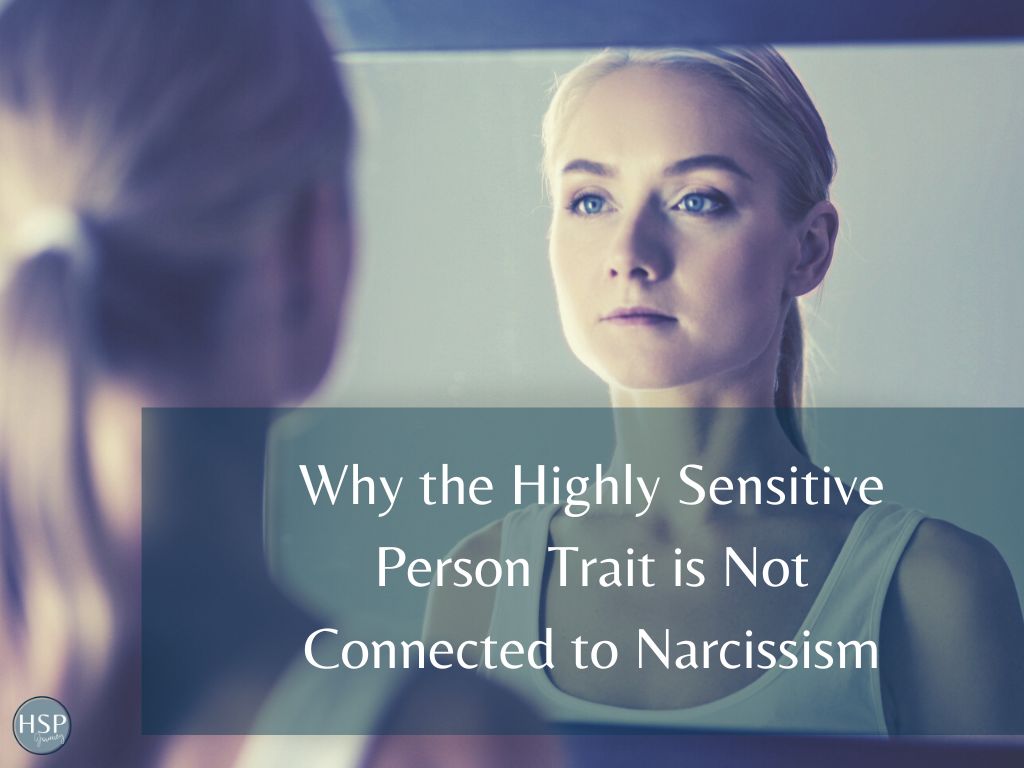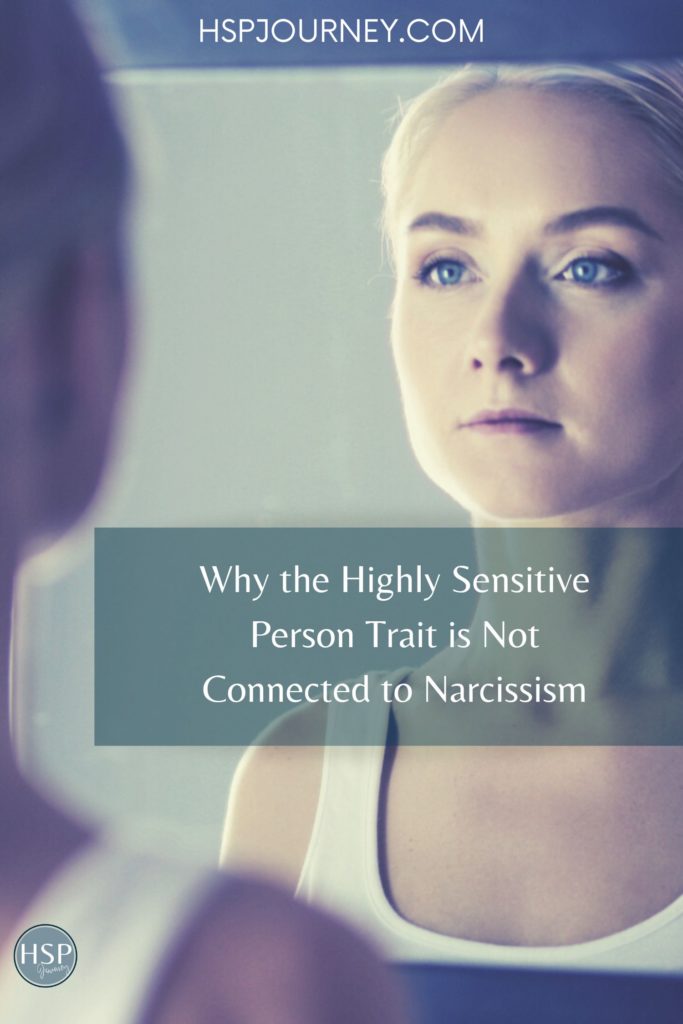Table of Contents
A research study came out in the psychological community this summer stating that there were significant similarities between those with vulnerable narcissism and the Highly Sensitive Person (HSP) trait. While initially many were curious, Dr. Elaine Aron, initial researcher and author of The Highly Sensitive Person, published a rebuttal stating why the Highly Sensitive Person trait is not connected to narcissism.

Researchers Find Overlap Between Highly Sensitive Person Trait and Vulnerable (Hypersensitive) Narcissism
This recent study was discussed on Psychpost, a site that publishes easily readable stories for non-researchers. The research was conducted by Emanuel Jauk and his colleagues.
Jauk was quoted as saying, “Our study showed that high sensitivity and hypersensitive narcissism are not the same thing, but they do have significant overlaps.”
Emanuel jauk
Dating back to the 19th century, the scientific of narcissism is a well-documented concept in psychiatry and is listed in the DSM. According to the DSM, Narcissistic Personality Disorder, is defined by:
- Grandiose sense of self-importance or uniqueness
- Preoccupation with fantasies of unlimited success, power, or brilliance, beauty, or ideal love
- Exhibitionism
- An inability to tolerate criticism
- The indifference for others
- Entitlement or the expectation of special favors without assuming reciprocal responsibilities.
- Interpersonal exploitativeness
- Relationships that alternate between extremes of over-idealization and devaluation
- Lack of empathy
Upon doing more research on vulnerable and hypersensitive narcissism, I came across a study on the same topic by the same researcher. This study seems to equate and link grandiosity with extroversion and vulnerability with introversion meaning that a person’s natural personality will direct what type of narcissism they are. This more recent study draws from the older study and equates HSPs with the covert or vulnerable type of narcissist.
The Personality Trait of Narcissism Versus Narcissistic Personality Disorder (NPD)
Narcissism has made its way into colloquial talk. You’ll hear people often referring to someone who seems completely self-interested. Many teenagers go through phases where they seem narcissistic, yet some traits in common with this disorder are a natural part of growing up.
It’s important to note that only a psychologist or psychiatrist can diagnose NPD, so be careful about how you toss around the moniker of narcissism. Many people have personality traits in certain areas, depending on their personality makeup, their upbringing, and personal baggage that may give them a proclivity towards self-focus. Often, unrealized or unprocessed trauma can cause normal people to become forelorn and self-focused.
NPD is graded on a scale with distinct markers to diagnose this clinically.
HSP is Not a Personality Problem and Highly Sensitive Person Trait is Not Connected to Narcissism
According to Dr. Aron, she feels gravely concerned that since this new research study seems to connect HSP negatively to a disorder, it will further influence the psychology community into believing that High Sensitivity is more of a problem and “personality problem,” to use her words. She has devoted nearly her entire career to researching and writing about the trait of HSP. She says:
More serious perhaps that this fresh ‘public discourse’ is that the journal that published the article is highly respected and widely read by clinical psychologists, meaning that some therapists will return to their view of high sensitivity as a ‘personality problem’ at best, not an innate trait.”Dr. Elaine N. Aron, ph.d., Research: High Sensitivity wrongly identified with narcissism, plus studies on parneting applied to managing and caregiving

Concerning Statements Made About Highly Sensitive Persons
Continuing on, Dr. Aron notes that there are quite a few serious and concerning statements about HSPs related to combatting personal growth due to high sensitivity (as an HSP, this is opposite to what I typically do when criticized. I usually press in and read as many books as I can to learn more and correct my flaws).
As with any profession or industry, there are those naysayers who’d rather quantify a trait or group of traits into a category of disorder. Why bother discovering something new when we can just lump it into an existing group? Jauk clearly falls into this category, aiming to debunk Aron and lump HSPs in with the narcissists, which I find personally appalling.
“I think we are seeing the usual human tendency to assume everyone is like us, and when someone is different from ourselves, we tend to doubt the reality of that.”
Dr. Elaine N. Aron, Ph.d., RESEARCH: HIGH SENSITIVITY WRONGLY IDENTIFIED WITH NARCISSISM, PLUS STUDIES ON PARNETING APPLIED TO MANAGING AND CAREGIVING
Aron’s concerns are valid and revolve around the classification of a personality trait such as the Highly Sensitive Person being classified as a disorder, which it is not. By teasing out the definitions of NPD and what is classified as a disorder versus the traits one aligns with in terms of personality, researchers, therapists, and even non-scientific people can better understand why the Highly Sensitive Person Trait is not connected to narcissism natively in terms of having a problem or disorder.
How do I know if I’m a Highly Sensitive Person (HSP)?
This is a great question. Many people who are highly sensitive feel that they were not understood as children. They were frequently told they were too sensitive or cried too often. You can reference our list of HSP quizzes to see how you score and this can inform whether or not you are a Highly Sensitive Person.
Be sensitive, be free
*This post contains affiliate links and I will be compensated if you make a purchase after clicking on my links*





[…] offers a roadmap that is both affirming and practical. As someone who resonates with the trait of high sensitivity, you’ll find the book’s insights to be a valuable companion. The author speaks directly […]